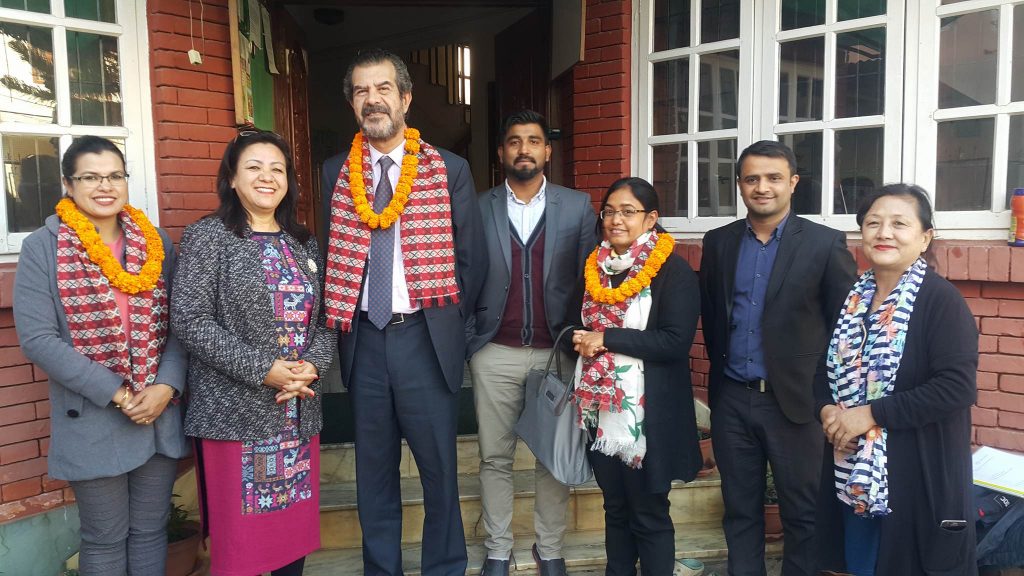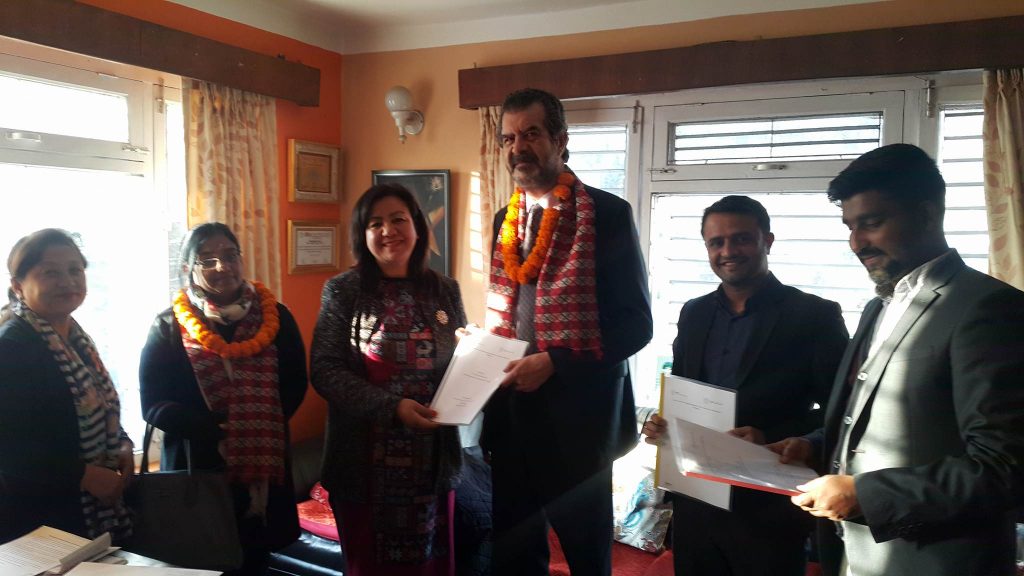- June 11, 2018
- Posted by: Lapsoj Nepal
- Category: Article
The Special Rapporteur on the human rights of Migrants, Mr. Felipe González Morales, visited Nepal on his mission from 29th January to 5th February, 2018.

The main focus of the visit was on labor migration from Nepal, recruitment practices, assistance provided to Nepalese migrants in destination countries, and the return and reintegration of labor migrants. During his visit, the Special Rapporteur met with government representatives, the National Human Rights Commission, members of the United Nations country team, migrant workers and their families, and representatives of civil society organizations, trade unions, recruitment agencies, and associations of medical centers and skills-training providers.
During the visit, as representatives of concerned non-governmental organizations, members of the Law and Policy Forum for Social Justice (LAPSOJ) had the opportunity to meet with the Special Rapporteur and present him with a written submission entitled ‘Access to Justice of Nepalese Migrant Workers (Present Day Problems and Challenges)’. The written submission was a joint submission on behalf of LAPSOJ and Pourakhi Nepal, two of the leading non-profit organizations working for the protection of Nepalese migrant workers’ rights.
The written submission by LAPSOJ was centered on the everyday challenges faced by migrant workers and the gaps in the existing legal framework limiting their access to justice. The submission consisted of a brief background of foreign labor migration in Nepal, the existing normative framework, including both national and international duties and obligations applicable in Nepal, and the major socio-economic and legal challenges faced by migrant workers in accessing justice. Additionally, in order to bring attention to areas requiring immediate reform, the submission highlighted the specific challenges experienced by women migrant workers and irregular migrants, the existing institutional mechanisms and their workings, and a list of recommendations.

The Special Rapporteur’s Findings
Based on the visit, the Report of the Special Rapporteur on the human rights of migrants on his mission to Nepal was published on 30th April, 2018. The report extensively presents migrant workers’ current situation in Nepal, the existing legal framework, the major gaps in the law, and the major problems faced by migrant workers. The report concludes that the government’s efforts in the sector are appreciated, but there still is a need for serious reform in Nepal’s laws, their implementation, and in the overall labor migration process. In this regard, the Special Rapporteur’s report provides specific recommendations to the government of Nepal, to destination states, and to the private sector.
The findings of the submission provided by LAPSOJ significantly contributed in providing information necessary to form the Rapporteur’s recommendations to the Nepal Government.
- One of the major legal gaps highlighted in LAPSOJ’s submission was the non-ratification of the Convention on the Rights of Migrant Workers and their Families, 1990 and the relevant ILO Conventions (the ILO Convention, 1997- Migration for Employment Convention (Revised) and the ILO Convention 143- Migrant Workers (Supplementary Provisions) Convention, 1975).
- The two major recommendations by the Special Rapporteur to strengthen the legal and policy framework are to ratify the International Convention on the Protection of the Rights of All Migrant Workers and Members of Their Families, 1990 and the relevant ILO Conventions. [Para 105 (a), (b)]
- The submission by LAPSOJ also highlighted major obstacles for migrant workers in accessing justice, pointing to the centralization of the redress mechanisms in the capital as one of the critical obstacles. In line with this, another recommendation by the Special Rapporteur to the government of Nepal is to ensure that barriers to accessing justice are removed so that effective access to legal remedy is available for violations of migrant workers’ rights in the context of recruitment practices and labor migration. The Special Rapporteur also pointed to the decentralization of the system as one way of guaranteeing such effective access. [Para 107(a)]
- Another issue raised in the submission by LAPSOJ was that of irregular or undocumented migrants who, because of their status, are denied protection of their rights. In this regard, the Special Rapporteur recommends that the government of Nepal should ensure that all persons, regardless of migration status, are able to enjoy the rights provided for in the Constitution without any discrimination, in accordance with international human rights law. [Para 110(b)]
- Female migrant workers’ issues, particularly the ban imposed on their migration, were also a major concern in LAPSOJ’s submission. Accordingly, the Special Rapporteur provides specific recommendations to the government of Nepal to withdraw the discriminatory restrictions and bans imposed on women migrant workers. [Para 109(a)]
- Another major challenge highlighted in the written submission by LAPSOJ was the disproportionate allocation of the budget to the concerned Ministry (i.e. the Ministry of Labor and Employment) in contrast to the high contribution of remittances to Nepal’s GDP. In line with such findings, one of the Special Rapporteur’s recommendations is to ensure that the Ministry of Labour, Employment is allocated a sufficient budget to effectively carry out its mandate, including by introducing e-government solutions. [Para 106(f)]
Additionally, some of the recommendations provided by LAPSOJ and Pourakhi Nepal were directly incorporated in the Special Rapporteur’s recommendations to the government of Nepal and concerned stakeholders. Example provisions include:
- Para 106(c) – Enhance the regulation and monitoring of the recruitment industry, by putting in place a comprehensive recruitment policy with high standards, developing fully robust, transparent and publicly accountable licensing systems for recruitment companies, subject to rigorous human rights and labor law due diligence, regulating irregular sub-agents and the sanctioning of unlicensed agencies, and effectively banning all types of recruitment fees paid by migrants;
- LAPSOJ’ and Pourakhi Nepal’s Parallel Recommendation: Access the current laws that regulate recruitment agencies and individual agents (sub-agents) and recommend prospective amendments if necessary;
- Para 107(e) – Make all the services necessary for ensuring effective access to justice for all migrant workers in destination countries easily available, such as legal aid, interpretation and translation services;
- LAPSOJ’ and Pourakhi Nepal’s Parallel Recommendation: Highlight the necessity of internationally recognized civil and political rights of migrant workers with special reference to external voting rights, mutual legal assistance and legal aid to migrant workers in destination countries;
- Para 108(b) – Increase, improve and decentralize pre-departure training and information, including on rights and redress mechanisms, promote informed decision- making and enhance the skill levels of prospective migrants, including language and general skills;
- LAPSOJ’ and Pourakhi Nepal’s Parallel Recommendation: Request that the government conduct necessary studies and update the existing curriculum of the pre-departure orientation training according to the current needs of migrant workers;
- Para 110(a) – Revise the current laws to bring them into line with the country’s international obligations, removing any discriminatory provisions;
- LAPSOJ’ and Pourakhi Nepal’s Parallel Recommendation: Analyze the existing laws and regulations governing labor migration in Nepal and determine their compatibility with the international laws and standards while addressing the concerns of migrant workers, irrespective of their status;
- Para 108(d) – Facilitate the repatriation of migrants in need, including those who have escaped from abusive employers or have ended up in an irregular situation, in detention or elsewhere;
- LAPSOJ’ and Pourakhi Nepal’s Parallel Recommendation: Call upon the government to establish a functional rapid response mechanism to assist migrant workers in distress.
LAPSOJ and Pourakhi- Nepal urge all stakeholders to duly implement the relevant recommendations
- Link to the Joint Submission (full document): http://lapsoj.org/wp-content/u
ploads/2018/02/Access-to-Justi ce-final_SR.pdf - Link to Special Rapporteur’s Report (full document): https://reliefweb.int/report/n
epal/report-special-rapporteur -human-rights-migrants-his- mission-nepal-ahrc3841add1
